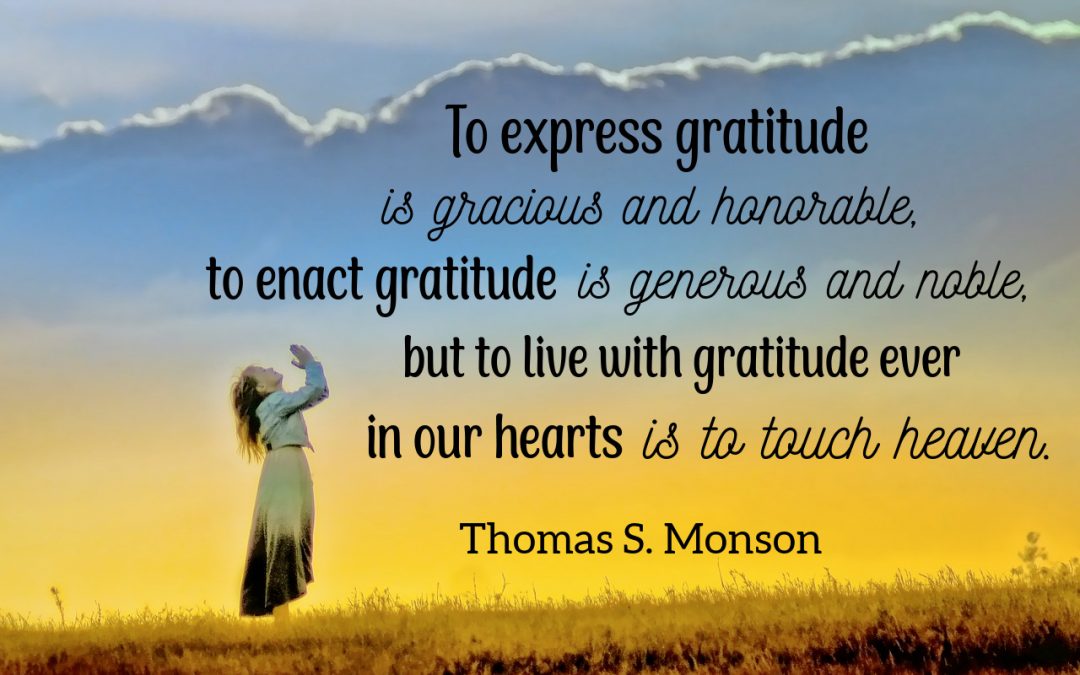Thanksgiving is often relegated to being the little holiday before the big one—Christmas. And the hustle and bustle of the Christmas season encroach more and more on the time we spend on giving thanks. Recently, my daughters were discussing how they wished they could just bypass Thanksgiving altogether and have Christmas. This wasn’t sitting too well with my youngest son, whose favorite holiday is Thanksgiving (probably because it’s so close to his birthday that some years they are on the same day). But regardless of his reasons, my son’s concerns about skipping a celebration focused on gratitude are valid. Our Thanksgiving observance helps to set the tone for Christmas. If we are more focused on Black Friday deals than on gratitude, our Christmas season will be all about getting and not about giving.
There is a healing power in gratitude and thanksgiving. And it is a power that is desperately needed. From the COVID-19 pandemic to civil unrest and the presidential election, our world is full of chaos. And the selfishness that is so prevalent in our society only adds to our woes. But there is a remedy. President Russell M. Nelson taught,
… Counting our blessings is far better than recounting our problems. No matter our situation, showing gratitude for our privileges is a unique, fast-acting, and long-lasting spiritual prescription. Simply stated, “In every thing give thanks” (1 Thessalonians 5:18).
Why is it important to give thanks in every thing? Here are five reasons:
1. Gratitude helps us deal with our trials.
Each one of us experiences challenges in our lives. Members of The Church of Jesus Christ of Latter-day Saints (sometimes mistakenly called Mormons or the Mormon Church) believe that is part of the plan and the reason that we are here on the earth—to learn and to grow. President Dallin H. Oaks said,
… We should even give thanks for our afflictions because they turn our hearts to God and give us opportunities to prepare for what God would have us become. The Lord taught the prophet Moroni, “I give unto men weakness that they may be humble,” and then promised that “if they humble themselves … and have faith in me, then will I make weak things become strong unto them” (Ether 12:27). …
As someone has said, there is a big difference between 20 years’ experience and 1 year’s experience repeated 20 times. If we understand the Lord’s teachings and promises, we will learn and grow from our adversities.
Often we don’t see the benefit of our trials while we are going through them. But the blessings are there. President Oaks taught,
The blessings of adversity extend to others. I know it was a blessing to be raised by a widowed mother whose children had to learn how to work, early and hard. I know that relative poverty and hard work are not greater adversities than affluence and abundant free time. I also know that strength is forged in adversity and that faith is developed in a setting where we cannot see ahead.
When I was growing up, my mother struggled with debilitating migraines that caused a lot of chaos in our household. But I learned to be kinder, more compassionate, and less judgmental because of those experiences.
2. Gratitude helps us to remember our blessings.
When life is going well and the living is easy, it’s easy to take things for granted—especially our blessings. Gratitude helps us to remember the things for which we are grateful regardless of how well things are going. President Thomas S. Monson said,
Sincerely giving thanks not only helps us recognize our blessings, but it also unlocks the doors of heaven and helps us feel God’s love.
The more we give thanks, the more blessings we will see in our lives. President Monson continued,
Regardless of our circumstances, each of us has much for which to be grateful if we will but pause and contemplate our blessings.
This is a wonderful time to be on earth. While there is much that is wrong in the world today, there are many things that are right and good. There are marriages that make it, parents who love their children and sacrifice for them, friends who care about us and help us, teachers who teach. Our lives are blessed in countless ways.
We can lift ourselves and others as well when we refuse to remain in the realm of negative thought and cultivate within our hearts an attitude of gratitude. If ingratitude be numbered among the serious sins, then gratitude takes its place among the noblest of virtues. Someone has said that “gratitude is not only the greatest of virtues, but the parent of all others.”
When we start to count our blessings, we will find more things for which we are grateful than we ever imagined. As Elder David A. Bednar taught,
A grateful person is rich in contentment. An ungrateful person suffers in the poverty of endless discontentment (see Luke 12:15).
3. Gratitude strengthens our faith.
Expressing gratitude for our blessings reminds us to turn to God, who is the Giver of all blessings. Sister Bonnie D. Parkin taught,
Gratitude requires awareness and effort, not only to feel it but to express it. Frequently we are oblivious to the Lord’s hand. We murmur, complain, resist, criticize; so often we are not grateful. In the Book of Mormon, we learn that those who murmur do not know “the dealings of that God who … created them.” The Lord counsels us not to murmur because it is then difficult for the Spirit to work with us.
Gratitude is a Spirit-filled principle. It opens our minds to a universe permeated with the richness of a living God. Through it, we become spiritually aware of the wonder of the smallest things, which gladden our hearts with their messages of God’s love. This grateful awareness heightens our sensitivity to divine direction. When we communicate gratitude, we can be filled with the Spirit and connected to those around us and the Lord. Gratitude inspires happiness and carries divine influence. …
Gratitude is our sweet acknowledgment of the Lord’s hand in our lives; it is an expression of our faith.
The more we express our faith through gratitude, the stronger our faith becomes. And the stronger our faith becomes, the more we turn our hearts to God.
4. Gratitude leads to repentance.
As we strengthen our faith and turn to God, we seek to more fully follow His commandments. Elder Robert D. Hales said,
The Lord said, “If ye love me, keep my commandments” (John 14:15). Our obedience to the laws, ordinances, and commandments is the greatest expression of love and gratitude that we can bestow upon him.
Gratitude is also the foundation upon which repentance is built.
How is gratitude the foundation upon which repentance is built? Of repentance, President Nelson taught,
This gift is not always well understood. As you know, the New Testament was originally written in the Greek language. In passages where the Savior calls upon people to repent, the word translated as “repent” is the Greek term metanoeo. This is a very powerful Greek verb. The prefix meta means “change.” We also use that prefix in English. For example, the word metamorphosis means “change in form or shape.” The suffix noeo relates to a Greek word that means “mind.” It also relates to other Greek words that mean “knowledge,” “spirit,” and “breath.”
Can we begin to see the breadth and depth of what the Lord is giving to us when He offers us the gift to repent? He invites us to change our minds, our knowledge, our spirit, even our breathing. For example, when we repent, we breathe with gratitude to God, who lends us breath from day to day.
When we are truly grateful for all that God has done for us, we want to express that gratitude through our obedience to His commandments. As we are all human, we all fall short and make mistakes. President Nelson continued,
True repentance is not an event. It is a never-ending privilege. It is fundamental to progression and having peace of mind, comfort, and joy.
5. Gratitude helps us to focus on others.
True gratitude helps us to focus on others. When we are happy, we want to share that happiness with those around us. Elder M. Russell Ballard taught,
It is only when we love God and Christ with all of our hearts, souls, and minds that we are able to share this love with our neighbors through acts of kindness and service—the way that the Savior would love and serve all of us if He were among us today.
When this pure love of Christ—or charity—envelops us, we think, feel, and act more like Heavenly Father and Jesus would think, feel, and act. Our motivation and heartfelt desire are like unto that of the Savior.
The Savior taught His disciples,
A new commandment I give unto you, That ye love one another; as I have loved you. …
By this shall all men know that ye are my disciples, if ye have love one to another (John 13:34–35).
Elder Ballard continued,
The love the Savior described is an active love. It is not manifested through large and heroic deeds but rather through simple acts of kindness and service.
As we share the love of Christ through simple acts of kindness and service, we are expressing our gratitude for our blessings and strengthening our faith in the Savior.
A Thanksgiving Story
This Thanksgiving, everyone was home except my oldest, who is serving a proselytizing mission in Texas. The girls were being teenagers and kind of obnoxious, and I grew weary of their complaining. I remembered a story I heard of a farm family who one year decided to get electricity in their home, and that was perhaps the last good thing to happen that year. The crops failed except for some turnips and they had to sell their livestock for a fraction of their worth. The kids were complaining about their paltry Thanksgiving meal, and so the father turned out the electric lights and brought out the old lanterns to show how much they really had to be grateful for. So I took a page from that book and turned out the lights. The one battery-powered lantern died just as we turned it on, so we lit three candles.
It’s amazing how much light a little candle doesn’t give off. It was hard to see the feast we had on the table. I eventually turned on the light in the bathroom nearby, but it was still pretty dark at the table. I then turned on a light in the next room, and my daughter made a snarky comment. So I turned it off again. And as a family, we discussed how we have been blessed by the sacrifice and effort of those who have gone before us. How much we really have now. It didn’t take long for my children to see … even in the dark.
The Healing Power of Gratitude
Gratitude has the power to lift us even on our darkest days. Elder Hales taught,
In some quiet way, the expression and feelings of gratitude have a wonderful cleansing or healing nature. Gratitude brings warmth to the giver and the receiver alike.
Gratitude expressed to our Heavenly Father in prayer for what we have brings a calming peace—a peace which allows us to not canker our souls for what we don’t have.
Humbly accepting the will of the Lord brings the peace that comes from trusting Him. Sister Parkin said,
The kind of gratitude that receives even tribulations with thanksgiving requires a broken heart and a contrite spirit, humility to accept that which we cannot change, willingness to turn everything over to the Lord—even when we do not understand, thankfulness for hidden opportunities yet to be revealed. Then comes a sense of peace.
And this is the secret to finding true happiness in life. It is the power of gratitude and thanksgiving. As President Monson said,
… To express gratitude is gracious and honorable, to enact gratitude is generous and noble, but to live with gratitude ever in our hearts is to touch heaven.









